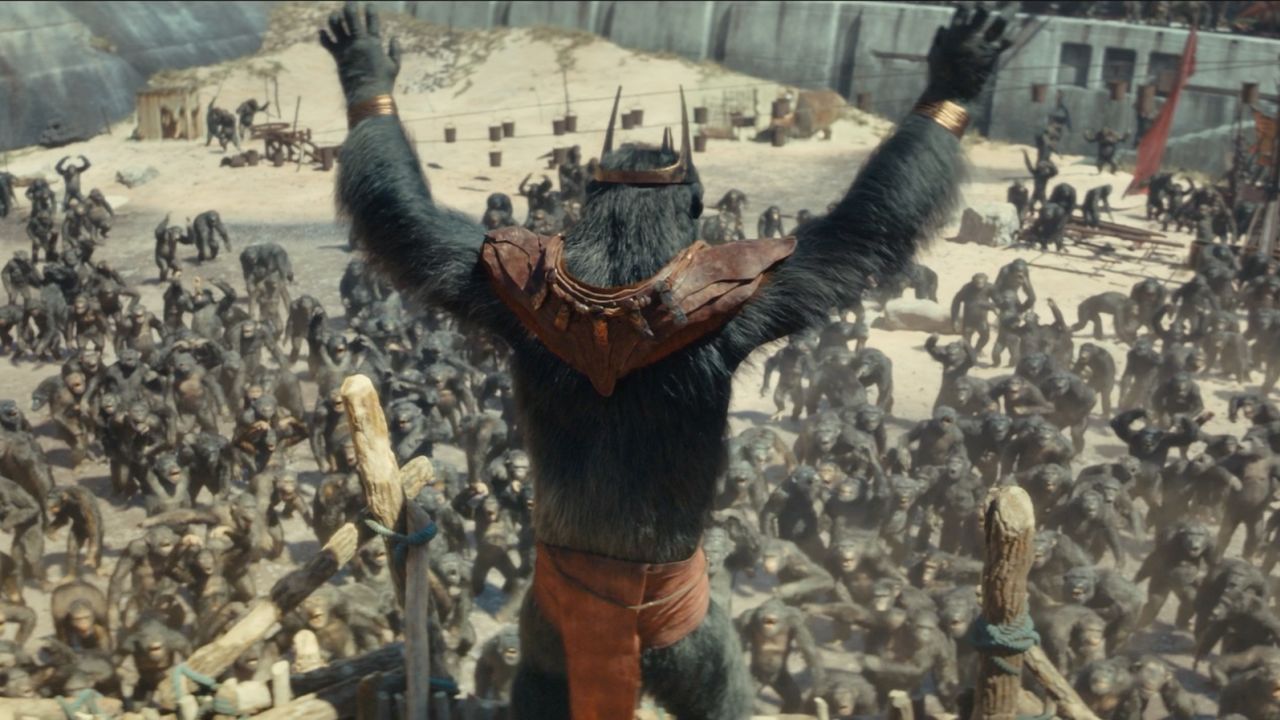They’re back! Batman captured Matt Reeves and Andy Serkis, so Wes Ball has left his mazes for the Planet of the Apes reboot puzzle. Despite the uphill battle, this reboot is still a winner, building upon what Caesar built generations before Noa (Owen Teague) shows up. Generations in ape time equals 7 years in real time, so keep that in mind for aging purposes.
After a quick, beautiful homage to Caesar, we’re now generations past his death. Apes are the dominant species on Earth now, sorta going through their middle ages splitting into little factions. Noa, Soona (Lydia Peckham) and Anaya (Travis Jeffery) are in a tribe that loves birds, as each complete a quest to get their eagle’s egg before the big ritual next morning. That ritual never takes place, because Sylva (Eka Darville) and a battalion of a more weaponized tribe destroy Noa’s village, and capture his mother Dar (Sara Wiseman). Noa, left for dead, gets a horse in search of his tribe, and picks up some acquaintances along his journey, including the Caesar acolyte Raka (Peter Macon) and an Echo, his word for human, called Nova (Freya Allan), much smarter than other Echo’s he’s encountered in the past.
I was very hesitant with the Wes Ball hire. While I liked the first Maze Runner, it isn’t exactly sterling storytelling, and the franchise really takes a nosedive after the only ok first one. But any issues with maze creation are wiped away in Caesar’s world: Ball’s best directorial attributes shine brightly in Kingdom. His eye for incredible sets translates remarkably well: this post human existence he builds is eerily beautiful. There’s this wonderful mixing of futuristic and old with medieval and new that works weird magic every new scene we see. Skyscrapers are now overgrown with lush green nature, the biggest “trees” imaginable. But big set pieces happen on wooden bridges over rivers or on cliffside locales overlooking an ocean. Ball really thinks about what modern devices today would look like if they went untouched for hundreds of years, helping ground the audience in a Twilight Zone reality they sorta recognize, and sorta don’t. Items we take for granted hold incredible power and wonder in a world that’s lost their meaning, as ape culture continues to grow and evolve.
The other big thing I learned about Planet of the Apes movies with Kingdom: thanks to the really excellent CGI advancements, the floor on these new ones is very high. By the simple premise of “apes rule the world,” all sorts of allegorical touches to our current times can be inserted and commented upon in these films. In this case, the script leans on Caesar as the “founding father” of ape culture, and what happens generations after he passes on. In this new world, without him around, all those lessons get twisted and warped to serve whatever purpose power hungry apes want to use to keep the pack in line. And when all else fails, Kingdom falls back on the tried and true evolution themes everpresent in this franchise. In this case, humanity has passed it’s weakest point, and might be back on the rise again, and for the apex apes, now comfortable on top, there’s all sorts of conflict that could resemble all sorts of real world scenarios: white nationalism, military/industrial complexes, racial conflicts, and hell even Israel vs. Palestine. Ball’s film gets a bit jumbled with what it’s trying to say, as it’s also trying to build a new world at the same time as throwing a bunch of stuff at the audience. But there’s enough still fertile ground there that gives me hope for future films now that we’ve laid the new foundation.
In a movie world in franchise disarray, the return of Planet of the Apes movies is more than welcome. Everyone involved here could phone them in, and repeatedly doesn’t, constantly extracting the most good out of what could be a tiresome moviemaking experience. So, Kevin Feige, maybe watch an ape film or two for some new ideas on how to make your cinematic universes execute better, long term. For a start? Stay in the Andy Serkis business and get into the Owen Teague business, so your CGI characters have some real depth about them.

